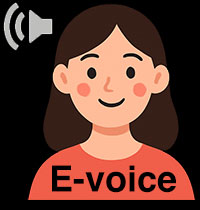1. こ・れ・に・し・よ
2. こ・ん・に・ち・わ
3. も・う・す・こ・し
4. こ・ん・に・ち・は
5. こ・れ・か・ら・わ

✅ The correct answer is:
4. こ・ん・に・ち・は
This corresponds to the Japanese greeting こんにちは (ko n ni chi wa), meaning “Hello.”
Although it's pronounced “konnichiwa,” the final sound is written as は (not わ).
This is because は is being used here as a particle (a grammar marker), and particles often keep their original spelling even if pronounced differently.
So, while 2. こ・ん・に・ち・わ sounds right, it’s not the correct way to write it.
This is a great example of how Japanese particles can “chase the sound” — but still follow the rules of writing.
Want to know more about particles like は?
Tap here to explore the Particle Section.


